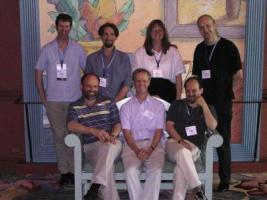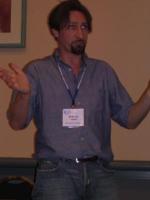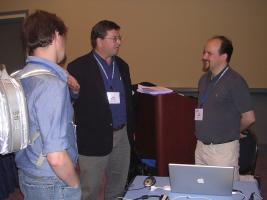Report on the CCP4 Workshop at ACA 2005, Orlando Florida
Peter Briggs
CCP4, Daresbury Laboratory, Warrington WA4 4AD, UK
Over the past three years CCP4 has established a tradition of holding
a one-day satellite workshop as part of the annual American
Crystallographic Association (ACA) meeting. This year's meeting was
held at the Walt Disney Swan Hotel in Orlando, in the "Sunshine State"
of Florida, and once again we were also there.
The workshop - entitled "The CCP4 Software Suite: A Protein
Crystallographic Toolbox" - was held on the 28th May (the
day before the full meeting) and attracted over fifty delegates with a
wide range of experience both with CCP4 and with macromolecular
crystallography in general. The aims were therefore to get novice users
started with the suite and show them how to use some of the key programs,
while at the same time trying to surprise more expert users with new or
less well-known aspects of the software.
The workshop followed the same format as in previous years:
introductory talks gave overviews of the software suite as a whole and
prepared the way for presentations on the specific packages. In the first
session Peter Briggs outlined many of the technical
non-crystallographic aspects of the software, focusing on CCP4i and the
gory details of MTZ files, followed by Johan Turkenburg giving a
tour of the crystallographic functionality of the suite from a user
perspective. He introduced a number of programs which even some more
experienced users might be unfamiliar with, and also stressed the
compatibility between CCP4 and other software suites such as SHELX
and ARP/wARP. Maria Turkenburg then gave an overview of
the broad range of help available within the suite and the CCP4 website.
The remaining sessions focused on practical aspects of running of some
of the "flagship programs". Harry Powell talked in detail about data
processing, integration and scaling using MOSFLM and
SCALA, in particular focusing on practical aspects such as how
to tell if data processing is working, and how to address warnings and
problem cases. Roberto Steiner covered the background theory of
REFMAC5 and gave a live demonstration of key features including
the use of TLS parameters and the generation of restraints dictionaries.
Finally live demonstrations were given by Stuart McNicholas and
Paul Emsley of the two aspects of CCP4's molecular graphics project,
CCP4MG andCoot respectively: the former currently focuses
on providing presentation-quality representations of molecular models, while
the latter is a platform for powerful model building tools. The
entertaining "double-headed" demonstration of Coot by Paul and Johan was
particularly popular, generating "oohs" and "aahs" from a rapt audience as
they watched side chains wriggle their way into the correct density.
The feedback from the workshop was very positive, and many people
reported that they would be trying out the things that they had heard
about (something that was borne out by the people who visited
the CCP4 exhibition stand after the workshop). There were also requests
for a longer workshop with more hands-on demonstrations and more examples
of real-life problems, which we will aim to address in future.
The workshop organisers Maeri Howard and Peter Briggs would
like to thank the ACA for the opportunity to run the workshop, the
speakers for their presentations and the delegates for attending. We
would also like to acknowledge the help of Ed Collins and
Marcia Colquhoun in setting up the workshop. Financial support
for the workshop was provided by CCLRC (from CCP4 industrial income)
and by the ACA.
The materials from the workshop can be found online at
http://www.ccp4.ac.uk/courses/ACA2005/ACAworkshop05.html. A similar workshop
will be held as part of the IUCr 2005 meeting in Florence in August, for
details see http://www.ccp4.ac.uk/courses/IUCr2005/iucr05.html.

Workshop speakers (from L-to-R, back row)
Peter Briggs, Roberto Steiner, Maria Turkenburg, Stuart McNicolas
(front row) Johan Turkenburg, Harry Powell, Paul Emsley
|

Roberto gives an indication of the radius
of convergence for Refmac5
|

Roberto and Paul field questions from
a workshop participant at the end of the day
|
Peter Briggs (p.j.briggs@ccp4.ac.uk)


